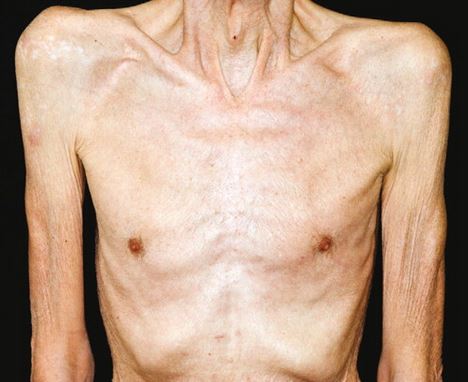

- HGH Deficiency
- So you took a look at yourself in a mirror recently and your heart sank by what you saw.
- Can Human Growth Hormones Really Reverse the Signs of Aging
- We hear about HGH or human growth hormone supplements far more often than we did just a few years ago.
- HGH Benefits for Men
- There are several benefits that males can derive from HGH use, although these are mostly off-label.
- How to Handle an HGH Deficiency in Adults?
- our physician tells you that you have a human growth hormone deficiency or HGH deficiency – now what? What does this mean?
- HGH Use for Bodybuilding
- Human growth hormone (HGH) is considered highly essential for the health and wellbeing of an average person.
- GenF20Plus Double Blind Clinical Study Shows Results That are Promising
- The market is full of unproven HGH products, but only the manufacturer of Genf20 Plus has taken the time to conduct a double blind clinical study.
Understanding Cachexia Causes and Treatment
Cachexia is an awful condition that is commonly connected with
cancer, although it is not restricted entirely to the fearsome
disease. It has been linked to about 1 in 5 deaths that occur in the
United States as a result of cancer. What causes cachexia and how is
the condition treated?

What is Cachexia?
Cachexia is a disorder that causes some unpleasant changes in the body, including muscle atrophy and extreme fatigue. Also referred to as wasting syndrome, it is formally defined as body mass loss that cannot be reversed through nutrition. The condition is mostly seen in people suffering from cancer, in which case it is described as cancer cachexia. Those suffering from lung cancer, stomach cancer and pancreatic cancer are said to be more prone to suffering from this problem. It is often described as a paraneoplastic syndrome, meaning its symptoms are the results of cancer-produced substances or the reaction of the body to the presence of cancer.
This disorder is not limited to cancer patients; people suffering from certain other conditions may also exhibit its symptoms. These diseases or conditions include HIV/AIDS, multiple sclerosis, chronic obstructive pulmonary disease, tuberculosis, mercury poisoning, and congestive heart failure. Cachexia elevates the risk of mortality from an underlying condition.
What are the Causes and Symptoms of Cachexia?
It is not entirely clear what leads to the development of cachexia. It has, however, been postulated that inflammatory cytokines, including tumor necrosis factor-alpha (also known as cachectin or cachexin), interferon gamma, and interleukin 6, contribute to its development. The syndrome may result from the presence of tumor-secreted proteolysis-inducing factor or due to the host response (body’s response to the existence of a tumor). It leads to catabolism or the breakdown of complex molecules needed for normal body functioning. Cachexia is also a symptom of AIDS and taking anti HIV medications could reverse it.
The signs and symptoms that may manifest as a result of cachexia include:
- Loss of appetite – Someone suffering from this disorder may experience loss of appetite, which is unlike the typical one that a person can have every now and then. It is characterized by both declined desire for food and loss of desire for eating.
- Unintentional weight loss – As a result of poor nutrition or infection with HIV a cachexic patient experiences loss in body weight which occurs involuntarily. This may even occur when a sufferer maintains adequate calorie intake.
- Muscle wasting – Along with unintentional weight loss, skeletal muscle wasting may be witnessed in people with cachexia. This negatively affects overall quality of life by hampering walking ability and agility.
Cachexia both worsens survival chances from underlying conditions and exerts negative impact on the quality of life. Loss of appetite and poor response to standard treatment, among other issues, cause a patient to become largely immobile as a result of physical weakness.
Diagnosis and Treatment Of Cachexia
Sometimes, the existence of a cachexia problem is not detected until the underlying condition has reached an advanced stage. A number of measures can be used to determine the presence of this disorder – your doctor will be able to help in this regard. A patient’s body mass index (BMI) and body composition are assessed. Certain blood tests such as white blood cell (WBC) counts and serum albumin test can also be carried out. Transferin levels and inflammatory markers such as C-reactive protein may be evaluated as well.
The choice of treatment for cachexia depends greatly on the underlying condition and other individual related factors. Options include:
- Medications – There are a variety of drugs that are used in the management of cachexia, although virtually none of these can be said to be 100% effective. The level of result that may be obtained will differ among patients. Progestins are considered helpful to those with refractory cachexia having anorexia as a major symptom. Short-term steroid use (no longer than two weeks) could also be helpful to patients with cancer cachexia. Other potentially beneficial medications and supplements include L-Carnitine, Thalidomide, Zyloprim (allopurinol), Hydrazine, non-steroidal anti-inflammatory drugs (NSAIDs), human growth hormone injections and omega-3 fatty acids. If Cachexia is caused by a medical condition; treating that condition could also reverse the weight loss.
- Diet – It is advised that a person suffering from cachexia maintains a healthy diet to prevent the problem from getting out of hand. You should note, though, that high calorie intake is not necessarily a foolproof remedy to this disorder. Increasing the amount of calories taken is recommended all the same, but this should be done gradually for a patient that has been suffering from cachexia-related loss of appetite for a long time.
- Exercise – Some experts have suggested getting active may help in dealing with cachexia, although this might sound contrary to sound reasoning. The idea is that exercise can help boost appetite and slow muscle atrophy or wasting that results from this disorder.
Treatment options that are sometimes explored also include nutritional counseling and psychotherapeutic interventions. Some studies have also suggested that recombinant growth hormone (Somatropin) therapy may be beneficial to people with cachexia. Clinical trials of some new medications are said to be promising for treatment in the future.
It sometimes takes longer time to detect the existence of cachexia in patients who have been diagnosed with certain causative diseases, even when present. For example, its symptoms are commonly noticed at a late stage of cancer development. It is recommended that this disorder be addressed as soon as a diagnosis of a related underlying condition has been made.

- "A lot of great info on HGH therapy and HGH supplements"
- Stan (Fort Lauderdale)
- "I almost started using prescription HGH injections but because of the high cost involved and the long list of side effects I opted for Genf20 plus instead and I was glad I did!"
- Jenifer (Los Angeles)
- "Before buying Genf20 Plus You must read the reviews at genf20plus.info"
- Eric (San Diego)
- "Thanks for showing both the benefits and the risks of using HGH"
- Nancy (NYC)
- Latest Articles
- All You Need to Know About HGH Replacement Therapy
- Human growth hormone (HGH) is required for some essential functions in the body.
- Maximize Your HGH Levels With Genf20 Plus, Diet and Lifestyle Choices
- Taking the HGH supplement can also help your pituitary gland to produce more HGH.
- Does Human Growth Hormone Work for Weight Loss?
- In addition to using HGH supplements you should consider intensive exercise and intermittent fasting.
- Gynecomastia in Men and How HGH Affects It
